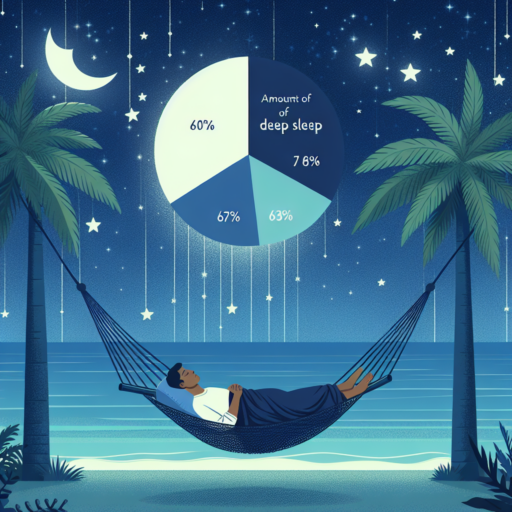No se han encontrado productos.
How much deep sleep is normal?
Understanding the amount of deep sleep one needs is essential for optimizing overall health and well-being. Deep sleep, also known as slow-wave sleep, is the most restorative sleep phase, during which the body repairs itself and builds up energy for the next day. While individual needs may vary, adults typically require 20-25% of their total sleep to be deep sleep. This translates to approximately 1.5 to 2 hours of deep sleep per night for a healthy adult who sleeps 7 to 9 hours.
Factors such as age significantly influence the amount of deep sleep one needs. For instance, newborns require much more, about 50% of their sleep to be deep sleep, reflecting the critical role this phase plays in their developmental process. The proportion of deep sleep tends to decrease with age, with older adults often experiencing shorter durations of deep sleep. This reduction can be linked to various factors, including health conditions and changes in sleep architecture.
To ensure you are getting enough deep sleep, paying attention to your sleep hygiene and establishing a consistent bedtime routine can be beneficial. Techniques such as limiting exposure to blue light, avoiding caffeine and heavy meals before bedtime, and creating a comfortable sleep environment can aid in increasing the quality and quantity of deep sleep. Remember, while the exact needs may vary from person to person, striving for at least 1.5 hours of deep sleep per night is a good benchmark for most adults.
Which is better, REM or deep sleep?
Understanding the characteristics and benefits of both REM (Rapid Eye Movement) and deep sleep stages is crucial for comprehending which might be better depending on your health and sleep goals. REM sleep, known for its intense dreaming phase, plays a significant role in memory consolidation and emotional regulation. On the other hand, deep sleep, the most restorative sleep stage, is pivotal for physical recovery, cell regeneration, and immune system strengthening.
In terms of cognitive function and mental health, REM sleep has shown to have a profound impact. It is during this stage that the brain processes emotions, memories, and stress. It’s also believed that REM sleep contributes to learning and brain development. However, without adequate deep sleep, individuals may not experience the full range of health benefits sleep offers, such as hormone regulation, tissue growth and repair, and energy restoration.
Comparing REM to deep sleep from a physical health perspective, deep sleep may often take a slight edge. This phase is crucial for those focusing on physical health, recovery from exercise, and overall bodily maintenance. Without sufficient deep sleep, one might experience a decline in immune function, higher stress levels, and problems with blood sugar regulation. Nonetheless, REM’s role in emotional and mental health cannot be underestimated, highlighting the symbiotic relationship between these two phases.
How much deep sleep is normal on an Apple Watch?
The question of how much deep sleep is normal on an Apple Watch is one that intrigues many users. The Apple Watch, with its advanced sensors, offers detailed insights into various sleep stages, including deep sleep. Deep sleep is crucial as it is the restorative phase of our sleep cycle, aiding in memory consolidation, cell regeneration, and energy replenishment.
To understand the norm, we have to delve into what the Apple Watch records under the Health app. Typically, an adult should aim for 1 to 2 hours of deep sleep per night, according to sleep experts. The Apple Watch uses motion and heart rate patterns to estimate when you’re in deep sleep, marking those periods where your body is in its most restful state.
It’s imperative to note that individual sleep needs vary. Factors such as age, lifestyle, and overall health can influence how much deep sleep one needs. Therefore, while the Apple Watch provides a general outline, assessing how you feel upon waking and throughout the day can also guide you in determining if you’re getting enough deep sleep. Regularly monitoring your sleep patterns with your Apple Watch can help identify trends and adjustments that may be necessary for your sleep health.
Is 4.5 hours of deep sleep too much?
When it comes to understanding sleep quality and its impact on health and well-being, the duration of deep sleep you’re getting is an essential factor to consider. Deep sleep, the most restorative sleep phase, plays a critical role in memory consolidation, physical recovery, and hormonal regulation. But can there be too much of a good thing?
Deep sleep typically occupies only 20-25% of an adult’s total sleep cycle, equating to about 1.5-2 hours for a standard 7-8 hour sleep period. Achieving 4.5 hours of deep sleep, therefore, significantly exceeds average patterns observed in most individuals. While the immediate reaction might be to view this surplus as beneficial, particularly in a society that often underprioritizes sleep, understanding the balance and cyclical nature of sleep stages is crucial.
Potential Implications of Excessive Deep Sleep
The question of whether 4.5 hours of deep sleep is excessive isn’t straightforward. On one side, it could indicate a highly efficient sleep cycle, particularly for those recovering from sleep debt or physical strain. However, exceeding the typical range for deep sleep might also suggest underlying health issues. Conditions such as hypersomnia or certain neurological disorders can lead to increased deep sleep, which, without proper management, could offset the sleep cycle’s balance, impacting overall health.
In conclusion, while optimal deep sleep durations vary by individual, consistently exceeding established norms like achieving 4.5 hours of deep sleep warrants further investigation. It’s a reminder of the delicate balance required in all aspects of health and the importance of listening to what our bodies are communicating through patterns of rest and activity.




